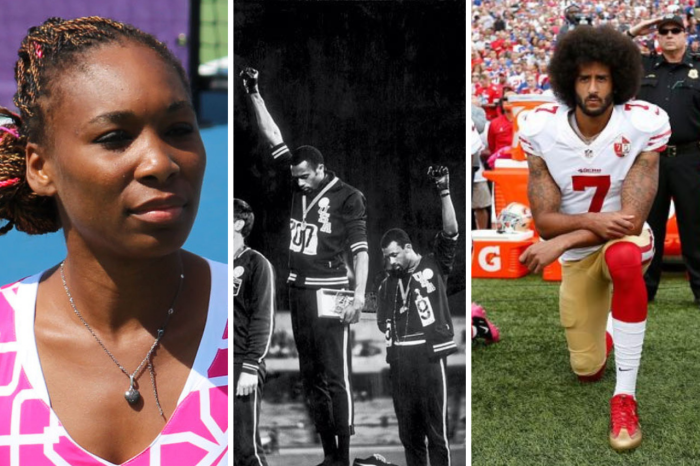Athlete Leaders of Social Change are redefining the boundaries of sports, using their platforms to advocate for justice and equality. From the iconic protests of Muhammad Ali to the contemporary activism of Colin Kaepernick, athletes have consistently leveraged their influence to challenge societal norms and drive positive change.
This essay delves into the historical and contemporary manifestations of athlete activism, exploring the impact of these individuals on shaping social movements and empowering marginalized communities.
Athlete Activism in History

Throughout history, athletes have played a significant role in advocating for social change. Using their platforms and influence, they have spoken out against injustice, promoted equality, and inspired countless individuals.
Jackie Robinson and the Breaking of the Color Barrier
One of the most iconic examples of athlete activism is Jackie Robinson, who broke the color barrier in Major League Baseball in 1947. Robinson’s courageous act not only paved the way for other African American players but also challenged societal norms and contributed to the broader civil rights movement.
Muhammad Ali and the Fight for Civil Rights
Muhammad Ali, the legendary boxer, was a vocal advocate for civil rights and social justice. He refused to be drafted into the Vietnam War on moral grounds and used his platform to speak out against racial discrimination and inequality.
Billie Jean King and the Fight for Gender Equality
Billie Jean King, a tennis champion, fought tirelessly for gender equality in sports. She founded the Women’s Tennis Association (WTA) and advocated for equal pay and opportunities for female athletes.
Colin Kaepernick and the Protest Against Police Brutality
In recent years, Colin Kaepernick, a former NFL quarterback, has become a symbol of athlete activism. He began kneeling during the national anthem to protest police brutality and racial injustice, sparking a nationwide conversation about these issues.
Modern Athlete Leaders

In the contemporary sports landscape, athletes are increasingly using their platforms to advocate for social change and inspire positive action. They are leveraging their influence and visibility to address a wide range of issues, including racial justice, gender equality, and climate change.
These athlete leaders are employing diverse methods to promote their messages, from social media campaigns and public speaking to direct involvement in activism and philanthropy. They are collaborating with organizations and initiatives that align with their values and using their voices to amplify important causes.
Colin Kaepernick
Former NFL quarterback Colin Kaepernick is widely recognized as a pioneer in athlete activism. In 2016, he began kneeling during the national anthem to protest police brutality and racial injustice. His actions sparked a national conversation and inspired other athletes to speak out against systemic racism.
Since then, Kaepernick has continued to be an outspoken advocate for social justice. He has established the Know Your Rights Camp, a non-profit organization that empowers young people to understand their rights and fight for change.
Serena Williams
Tennis legend Serena Williams has long been a vocal advocate for gender equality and women’s empowerment. She has spoken out against sexism and discrimination in the sports industry and beyond.
Williams has also used her platform to support organizations that promote education and opportunities for girls and women. She has partnered with the United Nations Foundation to launch the Serena Williams Fund, which supports programs that address gender inequality and empower women and girls.
Lebron James
NBA superstar Lebron James has been a vocal advocate for social justice and community empowerment. He has spoken out against police brutality and systemic racism, and he has used his platform to promote voting rights and education.
James has also established the Lebron James Family Foundation, which supports programs that provide opportunities for youth in underprivileged communities. The foundation focuses on education, health, and wellness, and it has invested millions of dollars in programs that make a difference in the lives of young people.
Megan Rapinoe
US soccer star Megan Rapinoe has been a leading voice for LGBTQ+ rights and gender equality. She has spoken out against discrimination and inequality, and she has used her platform to advocate for LGBTQ+ visibility and inclusion.
Rapinoe has also been a vocal critic of the Trump administration’s policies, and she has used her platform to speak out against racism, sexism, and xenophobia. In 2019, she was awarded the Presidential Medal of Freedom for her activism and advocacy work.
Athlete Activism in Different Sports

Athlete activism manifests in diverse ways across different sports, influenced by the unique characteristics and norms of each discipline. These variations impact the effectiveness of athlete activism and shape its impact on social change.
Individual vs. Team Sports
In individual sports like tennis or golf, athletes often have more autonomy and control over their platforms. This allows them to engage in activism more freely without the constraints of team dynamics or organizational policies. In contrast, team sports like basketball or soccer present different challenges.
Athletes must navigate the expectations and values of their teams, which can limit their ability to speak out on certain issues.
Contact vs. Non-Contact Sports, Athlete leaders of social change
The physical nature of a sport also influences athlete activism. In contact sports like football or hockey, athletes may be more hesitant to engage in activism due to concerns about retaliation or injury. In non-contact sports like swimming or gymnastics, athletes may feel safer expressing their views without fear of physical repercussions.
Major vs. Minor Sports
The popularity and visibility of a sport can impact the effectiveness of athlete activism. Athletes in major sports like basketball or soccer have a larger platform and can reach a wider audience with their messages. However, athletes in minor sports may have less influence and their activism may go unnoticed.
The Role of Social Media in Athlete Activism
The advent of social media has revolutionized the way athletes engage with social issues. Through platforms like Twitter, Instagram, and Facebook, athletes have gained unprecedented access to a global audience, allowing them to amplify their voices and mobilize support for causes they care about.
One of the most significant ways that social media has empowered athletes is by providing them with a direct channel to communicate with their fans. In the past, athletes were often reliant on traditional media outlets to share their views, which could result in their messages being filtered or censored.
With social media, athletes can bypass these gatekeepers and speak directly to their followers, ensuring that their voices are heard.
Challenges and Opportunities
While social media has provided athletes with new opportunities to engage in activism, it also presents a number of challenges. One of the biggest challenges is the potential for backlash from fans or sponsors who disagree with an athlete’s views.
This backlash can take the form of online harassment, threats, or even lost endorsement deals.
Another challenge is the constant scrutiny that athletes face on social media. Every post or tweet is subject to public scrutiny, and athletes must be mindful of how their words and actions will be perceived. This can lead to self-censorship, as athletes may be hesitant to express their views for fear of negative consequences.
Despite these challenges, social media also presents a number of opportunities for athlete activists. By using social media to raise awareness of important issues, athletes can help to educate their followers and inspire them to take action. They can also use social media to organize protests, rallies, and other forms of activism.
In conclusion, social media has become an indispensable tool for athlete activists. It has provided them with a direct channel to communicate with their fans, amplified their voices, and given them the opportunity to mobilize support for important causes. However, it is important for athletes to be aware of the challenges that social media presents, such as the potential for backlash and the constant scrutiny they face.
The Future of Athlete Activism: Athlete Leaders Of Social Change
The future of athlete activism is bright. Athletes are increasingly using their platforms to speak out on social issues, and they are having a real impact on the world. This trend is likely to continue in the years to come, as athletes become more aware of their power and influence.
There are a number of factors that will contribute to the continued growth of athlete activism. First, athletes are increasingly becoming role models for young people. In a world where social media and other forms of communication are constantly bombarding young people with messages, athletes can provide a positive and influential voice.
New Technologies
New technologies are also making it easier for athletes to connect with fans and followers, and to amplify their voices on social issues. Social media platforms like Twitter and Instagram give athletes a direct line to their fans, and they can use these platforms to share their thoughts and opinions on important issues.
Social Movements
The rise of social movements like Black Lives Matter and #MeToo has also inspired athletes to speak out on social issues. These movements have shown that athletes can be a powerful force for change, and they have encouraged athletes to use their platforms to speak out against injustice.
Expert Answers
How does athlete activism differ across different sports?
Athlete activism varies across sports due to factors such as the culture of the sport, the demographics of the athletes, and the level of media attention. Some sports, such as basketball and football, have a history of athlete activism, while others, such as golf and tennis, have traditionally been less vocal on social issues.
What are the challenges faced by athlete activists?
Athlete activists often face criticism and backlash from fans, sponsors, and even their own teams. They may also face threats of violence or career repercussions. Additionally, the demands of their athletic careers can make it difficult for them to balance their activism with their training and competition schedules.